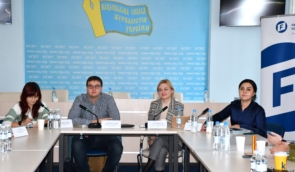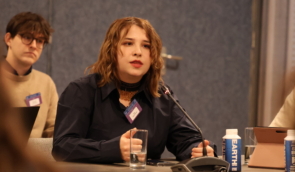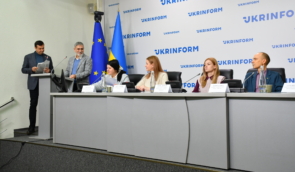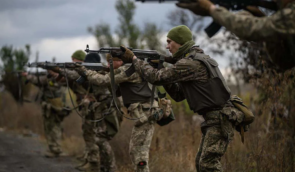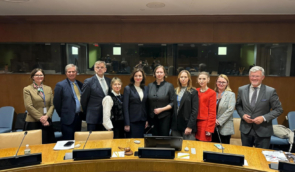How to break the wall of silence around Crimea: discussion in Vilnius
February 20, the human rights defenders, who had been on a monitoring mission to Crimea, presented a report on their trip at the Belarusian Human Rights House which works in exile in Vilnius. The representatives of the Human Rights Houses in Belarus, Azerbaijan, and Ukraine took part in the mission.
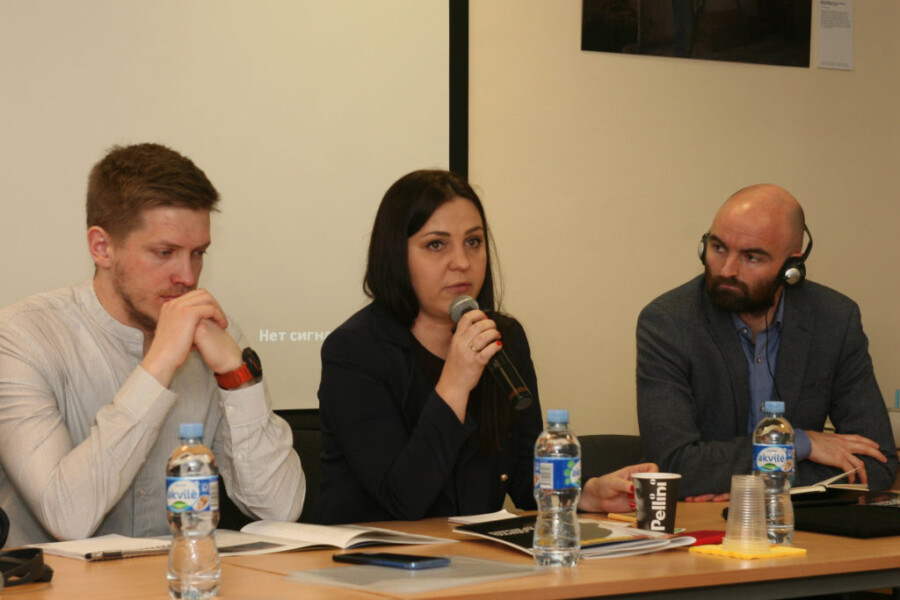 Kyrylo Yekymov, Tetiana Pechonchyk, Matthew Jones
Kyrylo Yekymov, Tetiana Pechonchyk, Matthew JonesTetiana Pechonchyk, the Head of the Human Rights Information Centre (Ukraine), pointed to the symbolism of the date: “On February 20, 2014, the massacre took place at the Independence Square in Kyiv, and a lot of protesters were killed. That was a turning point of the confrontation. On the same day, the Russian aggression against Ukraine started as the first groups of Russian military personnel in unmarked army uniforms appeared on the Crimean peninsula. “
Tatiana Reviako, a mission participant and moderator of the meeting, explained why the report on the trip was entitled “Breaking the Wall of Silence”: “Over the past five years of the annexation, Crimea seemed to have turned from the peninsula to the island, becoming an isolated zone. Almost no verified information comes from there, no international mechanisms work there, the monitoring missions of the UN and the OSCE have no access to Crimea, and at the same time the Crimean issue is gradually disappearing from the international agenda.”
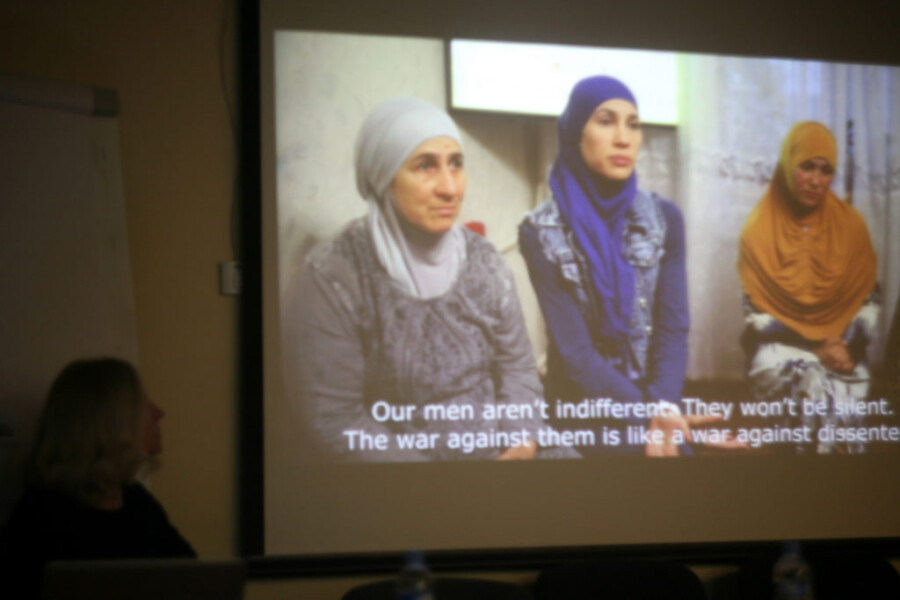 Tetyana Revyavko and frame of a documentary based on the results of the mission
Tetyana Revyavko and frame of a documentary based on the results of the missionThe international human rights organizations, including the Human Rights House Foundation, try to break this wall of silence. In September 2018, the Human Rights House Foundation sent an international mission to Crimea.
The Human Rights House Foundation mission differed from similar trips made by human rights activists because it publicly declared the human rights tasks as the purpose of their trip in conversation with the Russian border guards. At first, the human rights activists were detained at the administrative border with the occupied Crimea, but then they were allowed to enter Crimea. It is not known what factor played a decisive role, but the mission got to Crimea legally.
Oleg Matskevich, a mission participant from the Belarusian Human Rights House, emphasized that the trip was important to him not only as a human rights activist but as a citizen of Belarus also. In his opinion, Crimea shows what Belarus may turn into under a similar scenario: a place of deployment of military bases, a zone where people are deprived of the opportunities to protect their rights. Residents of Crimea are actually banned from identifying themselves as Ukrainians.
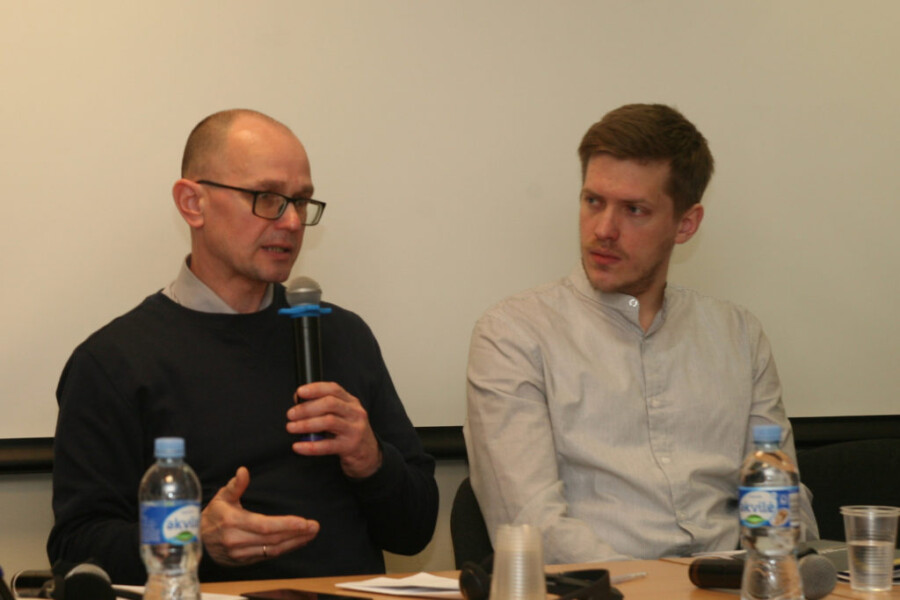 Oleg Matskevich and Kyrylo Yekymov
Oleg Matskevich and Kyrylo YekymovKyrylo Yekymov, a mission participant from the Educational Human Rights House Chernihiv, told that the mission members held 20 meetings and talked with fifty people for the four days of the trip. All the interviews were emotionally complex because the mission members had to talk with the people whose rights had been violated. The report, with rare exceptions, does not mention the names of the interviewed not to put them at risk by the publication of their answers.
Why has Crimea “gone silent”?
The human rights activists told that the military invasion of Crimea had started with the seizure of TV channels and cleansing the information space. In the first year of the occupation, most professional journalists were forced to leave Crimea or changed their profession because they would expose their life to danger if they continued to work. “The methods of oppressing the freedom of speech are barbaric, the punishment is public, cruel, pursuing the only purpose of intimidating the people,” the mission participants said.
Besides the informational space, the public space has been cleansed in Crimea as pursuant to the new registration rules, most non-governmental organizations have failed or refused to undergo re-registration and ceased their activities.
However, gradually a new voice is rising in Crimea.
“Our task is to help the new human rights community, to promote the strengthening of those, who are now ready to take lead on protection of the human rights in Crimea.”
Oleg Matskevich saw that difficult conditions draw people together:
– I would say that the citizen, social journalism started to flourish, if “flourish” is a proper word under these circumstances. People enjoy the fact that every smartphone has an Internet connection and live stream features; they are gathering near the courts, supporting each other.
According to the human rights activists, the new community, which now originates in Crimea in spite of the pressure, needs the support from the outside:
– We heard often from the interviewed Crimeans that they felt abandoned. It is very important that a topic of Crimea remains on the agenda. After all, there are people there, in Crimea, who are still fighting.
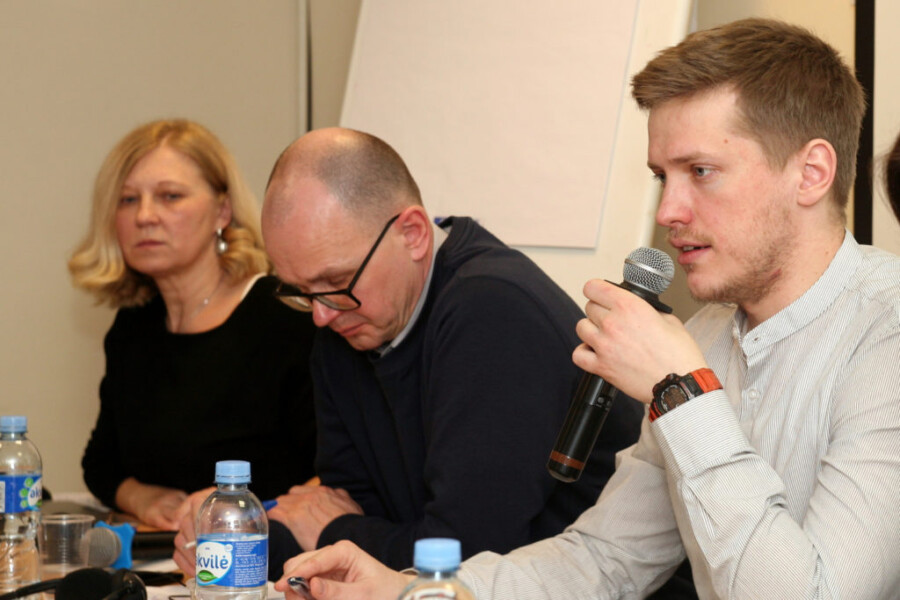 Tatiana Reviako, Oleg Matskevich, Kyrylo Yekymov
Tatiana Reviako, Oleg Matskevich, Kyrylo YekymovTatiana Reviako added that the new civil society, which is now being formed on the peninsula, could be compared with the Belarusian society of 20 years ago:
– At the end of the 1990-s, we, the Belarusian activists, had no experience, we did not understand what to do, and, perhaps, we were not even very effective. And today our task is to help the new human rights community, to promote the strengthening of those, who are now ready to take lead on protection of the human rights in Crimea.
***
The report was presented by:
- Tetiana Pechonchyk, the Head of the Human Rights Information Centre (Ukraine);
- Kyrylo Yekymov, the participant of the mission to Crimea, representative of the Educational Human Rights House (Chernihiv, Ukraine);
- Oleg Matskevich, the participant of the mission to Crimea, representative of the Barys Zvozskau Belarusian Human Rights House;
- Matthew Jones, international advocacy officer at the Human Rights House Foundation (Switzerland, Geneva).
Moderator: Tatiana Reviako, the participant of the mission to Crimea, representative of the Barys Zvozskau Belarusian Human Rights House.
Source: Human Rights House Foundation
If you have found a spelling error, please, notify us by selecting that text and pressing Ctrl+Enter.

